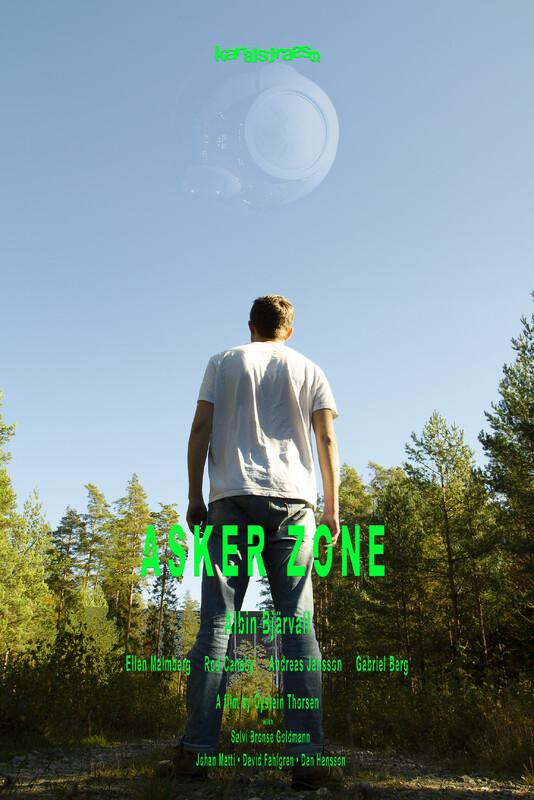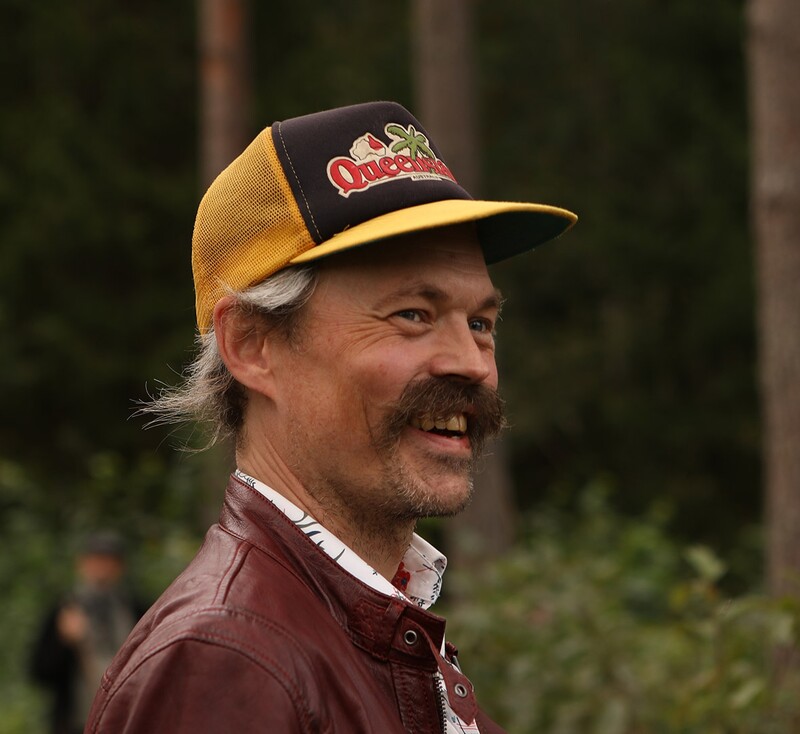Öystein Thorsen
Your project has entered in our festival. What is your project about?
It's about Pelé (27) who lives in a rural community where a huge spaceship has been observed beyond the atmosphere. People know almost nothing about what is going on, but when the underdog Pelé learns that they are trapped behind a lethal and invisible barrier, he decides to try and figure out if there is a way to escape. In addition to wanting to escape, it turns out Pelé also wants to prove himself.
Ultimately it's not a story about fighting aliens, but about the choices and promises Pelé makes. Pelé has to deal with what might be an alien invasion, but which is the biggest obstacle, his urge to redeem himself or the invisible barrier?
It's about Pelé (27) who lives in a rural community where a huge spaceship has been observed beyond the atmosphere. People know almost nothing about what is going on, but when the underdog Pelé learns that they are trapped behind a lethal and invisible barrier, he decides to try and figure out if there is a way to escape. In addition to wanting to escape, it turns out Pelé also wants to prove himself.
Ultimately it's not a story about fighting aliens, but about the choices and promises Pelé makes. Pelé has to deal with what might be an alien invasion, but which is the biggest obstacle, his urge to redeem himself or the invisible barrier?

What are your ambitions with your project?
Mainly I just wanted to make a full-length feature. After a few failed attempts to launch projects in a more traditional sense, meaning seeking co-producers, raise funds and all of that, I decided to write a story that could be produced on a small budget, where I controlled all the moving pieces.
Now that the film is completed, I hope we can find an audience for it, primarily via festivals. Eventually it would be great to sell it, in order to help finance a new project.
Tell us something about your shooting? What pleasantly surprised you?
That so many people showed interest! The production depended to a large degree on all kinds of people being volunteers, and in the end 50-60 people did one or more things for the film, without even knowing me or my co-producer - and wife - so that was really great to experience.
Another thing that made the production unique was that we had to solve a lot of challenges in the moment. Me and my wife prepared, but some participants not so much, which made parts of the shooting a bit ad hoc. But in a way I am glad it was as it was, because that mirrors the characters in the film; They are isolated, they do not have many resources, they have to figure things out on the fly, and so did we. I wonder if a big-budget, polished production could have made the story less grounded.
For what group of spectators is your film targeted?
I think most spectators really, from maybe 13 and upwards? It is a sci-fi, but it's not sci-fi-heavy, which means you don't have to be hooked on the genre. There is drama, and I try to discuss questions related to being human, so I think the film could appeal to a quite large group of viewers. I have described the film as "an unrealistic concept, handled in a realistic way" and I hope that makes the film grounded, and by that relatable.
Why should distributors buy your film?
Apart from what I hope is a grounded and relatable film, I think the film has a good curve. It starts off perhaps a bit slow, Pelé knows little, the audience knows equally little, but as the story progresses the tempo goes up and we are taken to new places that I think surprises the audience and eventually leaves them satisfied when everything is wrapped up.
How would you specify your work? What characterises your film?
Maybe I would say "real characters set in unreal or absurd situations". At least that is one red line I see when I think back on our last feature and the shorts I've done.
Why did you decided to become a filmmaker?
I always loved writing and making stories, and when I was a kid/teenager I made comic books. It turned out I did not have the patience to draw all those pictures, it's incredibly time-consuming, but the practice of writing a story and telling it visually must have made an impact on me. When a buddy's dad bought a video camera it didn't take long before we started to film sketches and such. I soon realised the way for me to tell stories is by filming, directing and editing the whole thing myself, and that is how it's been with all my productions so far.
Who is your role model?
I don't think about role models that much, but when it comes to who inspires me and who I look up to in film I have to mention Spielberg, Scorsese and Tarantino. In their own unique ways they are true masters and they inspire me in different ways.
Which movies are your favorites? Why?
Even though great films are released every year, it seems my favourites are the films from when I grew up. Indiana Jones, 12 Monkeys, The Fifth Element, most Star Wars films and Batman (1989) are films I've seen dozens of times, and I think it is because I saw those films with other eyes. Nowadays I seem to dissect films much more. In recent years, Wes Anderson has amazed me again and again, particularly with The French Dispatch, and the best film of 2023 was Triangle of Sadness. Fantastic images in the former and a unique storyteller in the latter.
Where do you look for inspiration for your films?
That can be absolutely anywhere, ideas drop all the time and inspire me to figure out various plots. Obviously most of the ideas are thrown at my mental landfill, but every now and then an idea sets root and eventually turns into a screenplay.
Which topics interest you the most?
I'm interested in a lot of societal topics, everything from equality and justice, to the climate crisis and all the wars and conflicts we currently witness, but I have never set out to create a story with a particular topic in mind because I think I would make it too on the nose. The topics in my films rely on the characters, and if I do not see a particular topic in the character(s), I throw them at the aforementioned mental landfill.
In Asker Zone, both the protagonist and the antagonist have a chip on their shoulder, they both want to prove themselves right in the face of everyone that doubted or ridiculed them. I developed that topic or theme as I got more acquainted with the characters.
Another example is "fear" which was a topic in an unfilmed screenplay I wrote. I prefer topics like that, simple, human, and hopefully I present them in a relatable way.
What do you consider your greatest achievement in your career?
I was very proud to sell a documentary to a Swedish network (TV4), but that was several years ago, so I guess "Behind the Scenes" (2021) is the greatest achievement. It was filmed without a screenplay, mostly just me and my wife, and it has done quite well at festivals all over the world. No one got rich in the process, but I am really glad that various juries out there liked it and even gave it a few awards. At the end of 2023 it received another official selection, and we are considered for Best Actor and Best Editing (which the film was nominated for in another festival as well).
What do you consider most important about filming?
That everyone involved understands - as well as possible - what we try to achieve, and that they care about understanding and achieving. Making a film is to have a target, and the more people know and understand, the easier it becomes to reach that target together.
Which film technique of shooting do you consider the best?
Since I have been forced to solve so much of the shooting myself over the years, I rely on tripods a lot, and even if it makes a somewhat static image I really like that calmness, rather than having the camera in constant motion.
On the other hand, every scene has its own needs and demands, so I try to use the techniques necessary for every individual scene. Being flexible, innovative and varied is the most important, I think.
How would you rate/What is your opinion about current filmmaking?
It's inspiring because so many things are happening at the moment, also with regards to A.I. These days, not only a selected few have access to advanced tools, instead, a lot of alternatives are available, for less money, than before and perhaps it makes filmmaking more democratic.
At the same time, even if we have all these digital opportunities, many filmmakers still want to work with practical effects and make sure as much as possible is done in camera - which I'm a fan of.
What can disappoint you in a movie?
I'm always disappointed when I notice the screenplay doesn't hold up. Perhaps they made a choice or two that didn't make sense or the ending just fell flat. I understand there can be challenges during a production, but when it's apparent that the screenplay is bad.. It baffles me that no one noticed earlier. Especially if it is a domestic film that has received a ton of support, and then you see all of that just flushed down the drain.
Who supports you in your film career?
Perhaps a bit weird to say, since she is co-producer on our two last films, but my wife is the one I feel the biggest support from. What I mean about that is that I do the sound mixing, the editing and the VFX work, which has resulted in me spending literally thousands of hours in front of the computer, and I don't take it for granted that spending all that time would be fine. But it seems this is our current process, where she steps in to give valuable feedback as the various sequences come together.
What are the reactions to your film? (opinion of spectators, film critics, friends and family)
Asker Zone is super fresh off the boat so it has not been screened anywhere yet, apart from a private screening for the actors and extras. The actors were happy though, so that is certainly nice. It would be a shame if they felt their time was completely wasted.
Have you already visited any of the prestigious film festivals?
No, none of the really big festivals at least. As mentioned, "Behind the Scenes" has been to a few festivals, but covid was still going strong so most of those were not with an audience, hence we didn't attend either.
What are your future plans in filmmaking carriere?
I have two or three concepts that interest me, but the stories need more work, so at the moment I don't know. It also depends whether Asker Zone, or Behind the Scenes - which we also try to get distribution for - can attract an audience or not. We cannot make zero/low-budget films in all eternity, so I hope these two films can help define our future in a positive way.
Learn more at: https://www.kanalstrasse.com/
